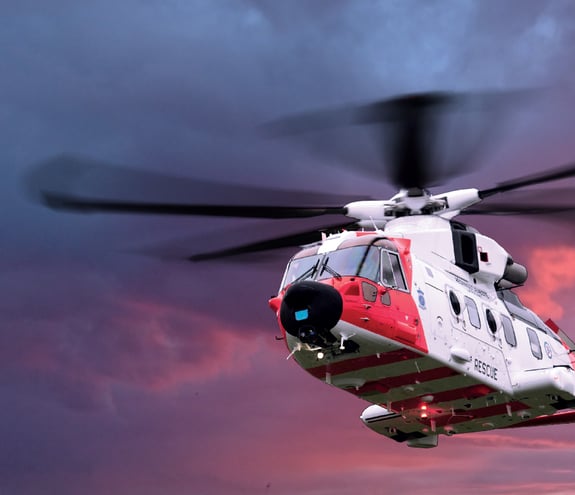Avionics
Leonardo Electronics’ latest-generation avionics offer robust capabilities for fixed and rotary-wing aircraft, both manned and uncrewed. These systems are designed to empower pilots with superior navigation and flight control, dependable data and information transmission, and critical "Friend or Foe" identification functions. Count on our avionics to perform reliably, even in the most challenging operational scenarios.
Identification (IFF)
M428 Compact Transponder
The M428 compact transponder is part of the family of MkXIIA (MkXII + Mode 5) transponders. The M428 achieves military identification through Mode 4 and Mode 5, supported by a removable encryption unit.
M427 Reverse Mode 5 Responder
The M427 Reverse Mode 5 responder is designed to prevent air-to-ground fratricide based on Reverse Mode 5, where interrogations are directed to targets at a specified set of geographic coordinates or within some specified range of distance.
Communications & Data Links
DLMS
The Data Link Management System (DLMS) provides the core element of data communications on manned and unmanned aerial platforms. As a Tactical Data Link Processor, it provides voice/data communications over broadband IP-based and legacy Tactical Data Link systems.
Multi Data Link Processor (M-DLP)
The requirement to share tactical information in real time within air, sea, and land scenarios is paramount for Defense Forces worldwide. This is one of the components to allow true Network Centric Operations. To achieve this objective, the military communication system being referenced to in this case is the Data Link.
Read more on Multi Data Link Processor.
SP-1450/N-E
The SP-1450/N-E Intercommunications System (ICS) is designed for use on both fixed-wing and rotary-wing platforms. It integrates all radio communications and navigation equipment, data links, and internal/external communications facilities into a single, Tempest-proven architecture.
RT - 200/400 Airborne Transceiver
The RT-200/400 family of advanced HF/SSB transceivers have been designed specifically for fixed-wing and rotary-wing avionic platforms and provide voice/data communications over the 2-30 MHz frequency range.
Read more on RT - 200/400 Airborne Transceiver.
SDR SRT-800 Airborne Radio
The SRT-800 family of airborne software-defined radios provides air-to-air and air-to-ground secure and cyber-resilient connectivity to military and commercial aircraft.
Read more on SDR SRT-800 Airborne Radio.
WDL-45/X
The WDL-45/X LOS is an avionics wireless communication system for downlink streaming of broadband Intelligence, Surveillance, and Reconnaissance (ISR) information, and the two-way transmission of Ethernet TCP/IP data, sensor control, mission control, and ATC voice.
Data Processing/Mission & Management/Navigation
AMMS
The AMMS is a powerful computing system that provides processing features to rotary wing aircraft, including Navigation & Flight Management, Cockpit Display Management, and Aircraft Plants Management.
ANV-353
The ANV-353 is a fully digital Doppler Velocity Sensor (DVP) that provides a continuous and accurate three-axis velocity measurement for both fixed- and rotary-wing aircraft applications.
CMDP
The Cockpit Mission Display Processor (CMDP) is a high safety avionics computer platform with a powerful embedded graphics capability. It is configured using the base of the standard hardware and layered software modules, both developed by adopting the latest quality standards that make the CMDP certifiable according to DO178B and DO254 level B (optionally level A) and suitable as a main cockpit mission computer.
skyISTAR
skyISTAR is a state-of-the-art multi-mission integrated sensor system for unmanned aircraft. Its service-orientated architecture allows easy system reconfiguration and the introduction of different sensor suites to match a wide range of military, para-military, and civil requirements.
ANC
The Avionics Network Computing (ANC) Platform is an integrated avionic equipment based on the Integrated Modular Avionics (IMA) concept, aimed at providing safe and secure communications services and data terminal management functions for manned and unmanned platforms.
ATOS
ATOS is the advanced, flexible, open architecture airborne mission management system that integrates a number of sensors and sub-systems to provide full situational awareness and timely decision making.
ULISSES
Ultra Light SonicS Enhanced System (ULISSES)- is the new lightweight modular Sonics System based on edge technology, to provide an affordable solution for advanced Anti-Submarine Warfare (ASW) operations.
Lighting Systems
LED IR-Visible Landing & Search Light
The LED IR-Visible Landing & Search Light is a steerable helicopter light with dual-mode capability with both visible LED and covert infrared (IR) LED modes. We are an industry leader in advanced, powerful light-emitting diode (LED) retractable landing lights and commercial lighting systems.

